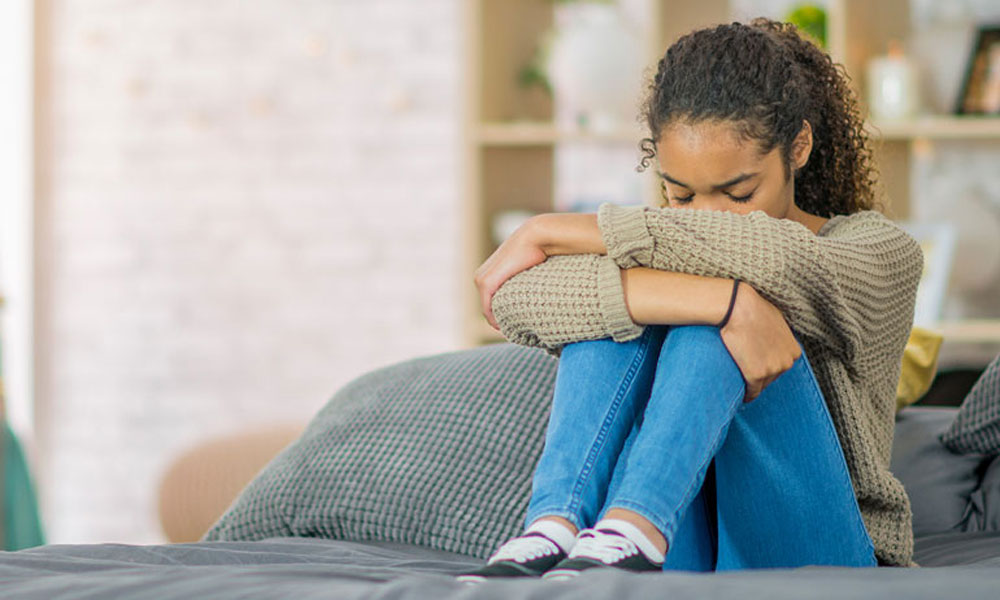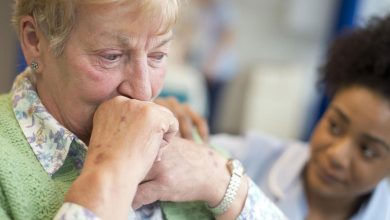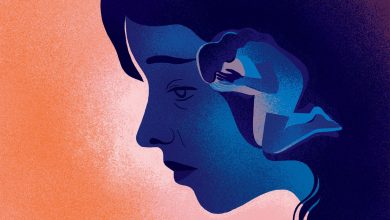7 Signs A Child Has Anxiety

Before a new child takes his or her first breath, part of their character is already shaped. Just ask any mom. Some infants are cool, calm, and picked up – displaying a persona that’s manner, manner past their years. On the opposite hand, some newborns appear hellbent on sabotaging any little consolation (say, a nap!) that the poor Mom tries to provide herself. Their demeanor seems to be riddled with little one anxiousness and unsettled most of the time.
Regarding anxiousness, scientists imagine that many types of childhood anxiousness are inherited. At the identical time, a genetic predisposition to worry does not low cost the truth that environmental components can result in its growth. The psychological well being web site Calm Clinic explains the potential causes of clinical anxiety:
“While it is entirely possible that (an) anxiety disorder is the result of a traumatic experience … the frequency of people with anxiety disorders also having a parent or parents with similar or identical disorders is too high to discount.”
Generalized Anxiety Disorder
Per the Anxiety and Depression Association of America (ADAA), Generalized Anxiety Disorder, or GAD, is “characterized by persistent and excessive worry about several different things. People with GAD may anticipate disaster and may be overly concerned about money, health, family, work, or other issues.
Moreover, individuals with GAD find it difficult to control their worries. They may even worry more than seems warranted about actual events or may expect the worst even when there is no apparent reason for concern.”
ADAA estimates that GAD impacts practically seven million adults, properly over three % of the inhabitants. Plus, girls are twice as prone to be identified with the dysfunction. Furthermore, it comes on regularly and might start at any age. The onset threat is highest between childhood and center age (mid-30’s to late 50s).
Per the web site Choose Help, the risks that can potentially lead to childhood GAD are vital, together with:
- Academic underperformance, dropping out of college, and frequent absences.
- Abuse of alcohol or medicine.
- Lack of self-confidence and shallowness.
- Limited or unhealthy relationships with friends.
- Continuing anxiousness and anxiousness issues into maturity.
Symptoms and Signs of Generalized Anxiety Disorder
The youthful the kid, the extra frequent it’s for them to exhibit probably anxious habits. As the kid age and enters center college and highschool, they need to cope with peer strain. This problem could end in them shutting down or being unable and unwilling to debate their emotions. Depending on the age and circumstances of the person, the signs and indicators of GAD could change.
Let’s first focus on the potential signs of GAD:
- Continuous muscle aches or stress.
- Excessive fatigue.
- Feeling irritable all the time.
- Inability to loosen up.
- Poor focus or incapability to pay attention.
- Problems sleeping.
Here are some outward indicators a toddler could also be affected by Generalized Anxiety Disorder:
1. Refusing to Attend School
Most youngsters, a minimum of in some unspecified time in the future, like going to highschool. In these life phases, they will’t wait to inform you about their pals and academics. Fast-forward to now, when you could be preventing to get them within the automobile. Maybe they’re complaining that their abdomen hurts, or they’ll throw up.
Suggestion: Talk to the varsity counselor and principal, which might help rule out bullying. Pay consideration to how the kid acts when college is out. Try to note any discrepancies.
2. All-Over Body Problems
Anxiety can throw a wrench into the kid’s pure physiology. Per Anxious Toddlers, LLC, here’s a checklist of how anxiety affects the child’s body:
- Chest space: issue respiration, chest ache, and coronary heart palpitations.
- Head: dizziness, complications, hair pulling, nightmares.
- Mouth: biting inside the cheek, nail-biting.
- Stomach space: constipation and cramping, diarrhea, nausea, and vomiting.
- Throat space: fixed coughing, issue swallowing, dry mouth.
Suggestion: If you see the presence of those behaviors, go to a health care provider for a bodily analysis. Ask the physician to inquire how the kid is feeling. Afterward, search the physician’s suggestions.
3. Outbursts of Anger
GAD is a extremely traumatic situation that may manifest into emotional outbursts. Alternating moods from glad to unhappy are typically evident in GAD victims. That stated, youngsters will likely be youngsters. So sudden outbursts will be attributed to any variety of issues. These causes can embrace puberty, peer strain, educational pressures, and many others.
Suggestion: First of all, let the kid know that such habits isn’t acceptable. GAD or no GAD, the kid should study to develop emotional self-regulation. In addition, you would possibly take into account potential therapeutic choices.
4. Disengaging from Activities
Stopping once-enjoyable actions is a possible signal of each anxiousness and melancholy. (Both issues can floor concurrently.)
So if you happen to ask why they’re avoiding their favourite pastimes solely to obtain a imprecise, unintelligible reply, it would be best to take into account all potentialities.
Suggestion: As talked about, sudden cessation of actions is a typical signal of tension and melancholy. Please deliver this to their physician’s consideration. However, first, take into account whether or not the kid is solely shifting on. Perhaps their pursuits have modified resulting from bodily and emotional growth.
5. Ritualistic Behavior
If a younger little one is inflexible about one thing needing to be achieved “just right,” it might trigger concern. If your little one will need to have all of his toys lined up or organized a sure manner and cannot relaxation till “just so,” one thing might be fallacious.
Suggestion: Routines are a wholesome a part of childhood, whereas rituals are a telltale symptom of an anxiousness dysfunction. While they’re manifesting anxiousness, attempt to soothe their issues. Depending on their age, taking part in a sport or studying to them might assist.
6. Bedwetting
Nocturnal enuresis, or bed-wetting, is linked to emotional problems and their toll on the physique. Kids who are suffering from an anxiousness dysfunction typically moist the mattress extra ceaselessly than regular and older.
Suggestion: Besides an anxiousness dysfunction, bed-wetting might also point out an immature bladder. In both scenario, search the recommendation of a health care provider. That’s as a result of, at occasions, the situation could result in an an infection, which may make circumstances worse.
7. Catastrophizing
Catastrophizing is “an irrational thought … in believing that something is far worse than it actually is.”
While comparatively frequent in adults, catastrophizing in childhood isn’t regular. Childhood GAD victims might also exhibit hypochondria, which is the worry of great sickness with out trigger.
Suggestion: Catastrophizing is a standard anxiousness symptom. However, it’s worrisome to witness in younger youngsters. So if you happen to observe this, share what you see with the kid’s healthcare supplier.
Final Thoughts on Child Anxiety
Childhood must be a time that brings emotions of journey and enjoyable. Indeed, anxiousness and despair shouldn’t be a daily incidence. Therefore, a prognosis of Generalized Anxiety Disorder can successfully suck the enjoyment out of being a child. More importantly, it may put the kid in danger for anxiousness issues into maturity.
Of course, it may be hurtful to witness your little one affected by an anxiousness dysfunction. Although you’re involved, you wish to keep away from making your worries evident. This can solely exacerbate an already troublesome scenario.
Most of all, take consolation. Many remedy choices can be found for a kid with anxiousness. Aside from medical intervention, quite a few on-line resources can advise mother and father and caregivers.
In abstract, the doable remedies for Generalized Anxiety Disorder embrace:
- Cognitive-behavioral remedy (CBT).
- Family remedy.
- Relaxation workouts (Deep respiration, mindfulness, and many others.).
- School counselor classes.
Additionally, anti-anxiety or antidepressants could assist right the kid’s neuro-chemical imbalances. So in some circumstances, your physician could advocate this remedy.












